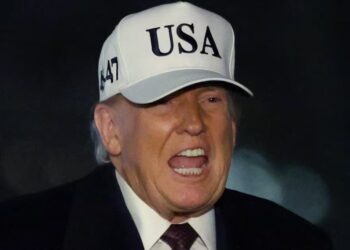President Donald Trump and members of his Administration have suggested that six Democratic politicians violated the law by urging members of the military and the intelligence community to refuse unlawful orders. But legal experts tell TIME that there was nothing illegal about the politicians’ message.
All six of the lawmakers—Sen. Mark Kelly of Arizona, Sen. Elissa Slotkin of Michigan, Rep. Jason Crow of Colorado, Rep. Chrissy Houlahan of Pennsylvania, Rep. Maggie Goodlander of New Hampshire, and Rep. Chris Deluzio of Pennsylvania—either served in the military or in national security positions before they were elected to office. In a video they shared last week, they reminded members of the military and intelligence community that they “can refuse illegal orders” and that “no one has to carry out orders that violate the law or our Constitution.”
[time-brightcove not-tgx=”true”]
The video sparked outrage from the President, who labeled it as “SEDITIOUS BEHAVIOR, punishable by DEATH!” Vice President J.D. Vance posted on X on Sunday that “If the president hasn’t issued illegal orders, [then] members of Congress telling the military to defy the president is by definition illegal.” On Monday, the Department of Defense (DoD) announced that it would investigate Kelly for potential breaches of military law as a result of his participation in the video.
On Tuesday, Slotkin posted on X that the FBI’s Counterterrorism Division “appeared to open an inquiry into” her the previous evening, in response to the video. Reuters reported Tuesday that the FBI has requested interviews with all six of the lawmakers.
But legal experts say that nothing in the video was “seditious” or “illegal,” and that there is no basis for the Pentagon to investigate Kelly for participating in the video.
“They did not encourage unlawful action,” Brenner Fissell, professor of law at Villanova University Charles Widger School of Law and vice president of the National Institute of Military Justice (NIMJ), says of the lawmakers in the video. “They were not encouraging the disobedience of lawful orders; they were encouraging the disobedience of unlawful orders. And that is a correct statement of the law.”
The Uniform Code of Military Justice (UCMJ) says that service members must “obey any lawful general order or regulation.” There is a strong presumption that orders are lawful under military law, according to the NIMJ. But service members are allowed to disobey unlawful orders—and they could even be prosecuted for carrying out patently unlawful orders, such as war crimes.
“They said, ‘Don’t follow unlawful orders,’ and somehow Vance interprets that to mean, ‘disobey everything Trump does.’ That’s not what they said. Legally, he’s wrong,” Fissell says. “It’s not even a logical statement.”
Claire Finkelstein, professor of national security law at the University of Pennsylvania Carey Law School, says that the lawmakers have the right to freedom of speech and “were not in any sense instigating the commission of a crime;” rather, they were simply “stating their interpretation of the law as best they understood it.”
She adds that the lawmakers didn’t urge members of the military and intelligence community to disobey any particular orders.
None of the lawmakers specified in the video what had motivated them to share the message, or what kind of unlawful orders service members may be receiving. Trump’s use of the American military has repeatedly drawn legal scrutiny in recent months. Many legal experts have questioned whether there is legal justification for the strikes that the Trump Administration has ordered on boats in the Caribbean that it has accused of transporting drugs. The President has also faced both political and legal backlash over his deployment of National Guard troops to cities across the country as part of a crackdown on crime. Judges have ruled that the President broke the law when he sent troops to Washington, D.C., and Los Angeles.
In announcing that it was investigating Kelly, the DoD cited a provision of the UCMJ that prohibits somebody who has the “intent to interfere with, impair, or influence the loyalty, morale, or discipline of the military or naval forces of the United States” from advising, counseling, urging “or in any manner” causing or attempting to cause “insubordination, disloyalty, mutiny, or refusal of duty by any member of the military or naval forces.”
While Kelly could still be subject to military law as a retired U.S. Navy captain, the basis for any prosecution related to that video “is questionable at best,” says Saira Mohamed, professor of law at the University of California, Berkeley School of Law.
“I think it’s groundless,” Mohamed says of the department’s investigation. “Senator Kelly’s statement, again, is just restating the law and the obligations of members of the military and intelligence forces; it is not advising or urging insubordination or disloyalty or mutiny or refusal of duty.”
Kelly dismissed the Pentagon’s investigation on Monday, saying in a statement posted on X: “If this is meant to intimidate me and other members of Congress from doing our jobs and holding this administration accountable, it won’t work. I’ve given too much to this country to be silenced by bullies who care more about their own power than protecting the Constitution.”
Read more: One Republican Lawmaker Speaks Out After Mark Kelly Notes GOP Silence on ‘Sedition’ Controversy
Legal experts warn that the Trump Administration’s response to the video is grounds for concern. Mohamed says she sees the department’s investigation “as part of the Administration’s broader attack on the law.” She and other experts worry that announcing such an investigation into Kelly could lead to an environment in which people are afraid to share their thoughts or criticisms about the Administration because of concerns of retaliation.
“I think what you’re seeing right now is an attempt to create a chilling atmosphere that inhibits free speech rights,” Fissell says. “It’s especially problematic for the separation of powers when the people whose speech is being chilled are duly elected members of the legislative branch.”
“Mark Kelly needs to be able to inject his viewpoint in the public consciousness,” he continues. “He’s a senator—he’s one of only 100 senators—and to use military criminal law to chill the speech of a senator is scary.”
Finkelstein says that accusing lawmakers of serious charges, such as seditious conspiracy, when there’s no foundation for it could even put those lawmakers’ safety at risk.
After the lawmakers shared the video, a user on Truth Social called for the lawmakers to be hanged—a post the President reshared on his own account.
Senate Minority Leader Chuck Schumer has accused the President of “calling for the execution of elected officials” with the posts on his social media platform.
“This is an outright threat, and it’s deadly serious,” Schumer said while speaking on the Senate floor on Thursday.
In an interview the following day, Trump said he was “not threatening” the lawmakers. “But,” he added, “I think they’re in serious trouble. In the old days, they would have [been] dead.”
“I think it’s a very, very dangerous—an extremely dangerous—precedent for Presidents … to endanger members of Congress who happen to disagree with him,” Finkelstein says. “That ought to be something that all members of Congress rise up and reject, whatever their political affiliation.”
The post Is It ‘Seditious’ or ‘Illegal’ to Urge the Military to Refuse Unlawful Orders? Legal Experts Weigh In appeared first on TIME.




